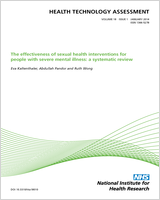Included under terms of UK Non-commercial Government License.
NCBI Bookshelf. A service of the National Library of Medicine, National Institutes of Health.
Sackley CM, Walker MF, Burton CR, et al.; on behalf of the OTCH investigators. An Occupational Therapy intervention for residents with stroke-related disabilities in UK Care Homes (OTCH): cluster randomised controlled trial with economic evaluation. Southampton (UK): NIHR Journals Library; 2016 Feb. (Health Technology Assessment, No. 20.15.)

An Occupational Therapy intervention for residents with stroke-related disabilities in UK Care Homes (OTCH): cluster randomised controlled trial with economic evaluation.
Show detailsCare home residents with stroke-related disabilities tend to be more disabled than those living in the community. During the day, care home residents spend most of their time sitting down. This inactivity can cause further health problems. Occupational therapy is a service that has been shown to help a person perform everyday tasks, such as getting dressed. However, occupational therapy is rarely available in UK care homes.
This study aimed to find out whether or not care home residents with stroke-related disabilities would benefit from occupational therapy and if it would help them become more involved in everyday tasks.
Overall, 1042 stroke survivors from 228 care homes across England and Wales took part. The homes were split randomly into two equal-sized groups. Stroke survivors in half of the care homes received occupational therapy and those in the remaining care homes received their usual care. The two groups were compared after 3, 6 and 12 months using a test that measured how much help they needed in performing everyday tasks, such as washing and getting dressed. The cost of providing occupational therapy in care homes was also measured.
The results showed that no extra benefit will be obtained by providing occupational therapy to stroke survivors living in care homes, compared with their usual care. Offering this intervention does not represent good value for money compared with other NHS services.
Referring UK care home residents with stroke-related disabilities to occupational therapy may be effective on an individual basis, but this study suggests that making it a part of routine care will be of limited benefit.
- Plain English summary - An Occupational Therapy intervention for residents with ...Plain English summary - An Occupational Therapy intervention for residents with stroke-related disabilities in UK Care Homes (OTCH): cluster randomised controlled trial with economic evaluation
- Discrete choice experiment attribute selection topic guide - Carer administratio...Discrete choice experiment attribute selection topic guide - Carer administration of as-needed subcutaneous medication for breakthrough symptoms in people dying at home: the CARiAD feasibility RCT
- Study summary - Sexual health promotion in people with severe mental illness: th...Study summary - Sexual health promotion in people with severe mental illness: the RESPECT feasibility RCT
- Scientific summary - Contrast-enhanced ultrasound and/or colour duplex ultrasoun...Scientific summary - Contrast-enhanced ultrasound and/or colour duplex ultrasound for surveillance after endovascular abdominal aortic aneurysm repair: a systematic review and economic evaluation
- Scoring and algorithm for Geriatric Depression Scale-15 - Exercise for depressio...Scoring and algorithm for Geriatric Depression Scale-15 - Exercise for depression in care home residents: a randomised controlled trial with cost-effectiveness analysis (OPERA)
Your browsing activity is empty.
Activity recording is turned off.
See more...